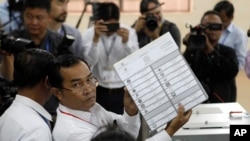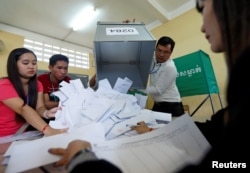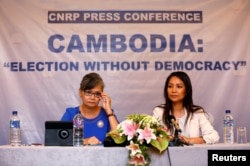In an election slammed by rights groups as a sham because the main opposition party was banned, the Cambodian People’s Party said it now controls all 125 seats in the National Assembly.
CPP figures show voters’ second most popular choice was to spoil their ballots despite the government's threats against those considering using their constitutional right to boycott the election.
“I can't confirm the official figure, but I can say that the CPP will get most of the seats at the National Assembly. The [National Election Commission’s] position is to give the figure of what party got however many seats, so I can't give on behalf of the arbitrator,” CPP spokesman Sok Eysan said.
Asked if he felt the result was a bad look for the legitimacy of the election, Sok said the party didn’t “have any concern about criticisms.”
“So the result of the election shows that there is aprogression of democracy in Cambodia as people used their right to decide the future of the country,” he said.
Cambodian Prime Minister Hun Sen is now set to extend his already 33 year reign by another five, free of any real opposition party. Nineteen minor parties took part in the election, winning a small fraction of the vote among them.
Invalid ballots totalled 9.11 percent of votes with the royalist FUNCINPEC coming in third with 5.82 percent of the vote, according to the CPP figures.
The data though is somewhat inconsistent with National Election Committee (NEC) preliminary figures released Monday morning that also suggests the CPP will win every seat but show 8.57 percent of votes were invalid.
“NEC until now, my institution, do not issue any official results yet because we are still waiting for the results from 8 polling stations,” NEC spokesman Dim Sovannarom said.
Either way it looks clear that a substantial number of voters chose to spoil their votes as was widely expected.
Late last year the CPP’s only real opponent in the election, the Cambodia National Rescue Party (CNRP), was dissolved and its leader Kem Sokha jailed on widely derided allegations it was fomenting an internationally backed plot to overthrow the government.
The CNRP, which almost defeated the CPP at the last national election, launched a “clean finger” campaign in response, urging voters to boycott the election.
Hun Sen’s government retaliated, launching criminal action against those promoting the campaign while threatening voters of consequences should they abstain.
US reaction
The U.S. government called the elections neither “free nor fair” and said it would consider punitive measures including an expansion of visa restrictions on senior members of the regime.
“We are profoundly disappointed in the government’s choice to disenfranchise millions of voters, who are rightly proud of their country’s development over the past 25 years,” the White House office of the Press Secretary said in a statement.
“The campaign was marred by threats from national and local leaders to punish those choosing not to vote. These actions denied the Cambodian people a voice and choice in determining the future of the country.”
Last week, the U.S. House of Representatives passed a sanctions bill targeting members of Hun Sen's inner circle, including his children and other family members, in response to the country’s authoritarian backslide.
The United States, the European Union, Japan, Canada and Australia all declined to send observers to the election.
Instead, the Cambodian government looked towards countries such as China, Iran and Russia to legitimize the result as well as private observers from across the world.
Of these 539 observers, those who addressed the media after the close of polls yesterday almost all gave the ballot a resounding tick of approval.
They avoided any discussion of the many alleged inconsistencies such as the banning of the opposition, the blocking of more than a dozen media outlets' websites before the vote or threats made against those considering boycotting the ballot.
“I have no knowledge of any opposition party being banned from anything,” said observer and UK Independence Party member Richard Wood, before defending his right not to study the context of the election in his role.
“How can we on one side, accept to host the Thailand president in France and on the other side, criticize the elections in Cambodia,” asked observer Emmanuel Dupuy, president of the Institut Prospective et Sécurité en Europe.
One of the only observers to raise any concerns at all was Fund for Reconciliation and Development executive director John McAuliff, who said the context of the election was “imperfect”.
“It was also very notable during the count that the second largest party in Cambodia is the spoiled ballot party — that is every polling place there were at least 20 percent. In one of the polling places we looked at it was more like 35 percent spoiled ballots.”
Opposition says democracy replaced by 'Dictatorship'
At a press conference in Jakarta on Monday, CNRP vice president Mu Sochua, one of many opposition figures now living in exile, said democracy in Cambodia had been replaced with outright dictatorship.
"29 July, 2018 marked the death of democracy in Cambodia, a dark new day in recent history," she said.
More than a dozen websites, mostly media organizations that scrutinize the Cambodian government, were blocked in the final days of the campaign including Voice of America Khmer.
Yon Sineat contributed to this report.










